 Libri di Samir Amin su Unilibro.it) Libri di Samir Amin su Unilibro.it)
|
|
2022 |
 Title :
Eurocentrismo. Modernità, religione e democrazia. Critica dell'eurocentrismo, critica dei culturalismi
Title :
Eurocentrismo. Modernità, religione e democrazia. Critica dell'eurocentrismo, critica dei culturalismiAuthor: Amin Samir; Riolo G. (cur.) Publisher: La Città del Sole Già dalla prima edizione del 1988, Eurocentrismo è divenuto un classico del pensiero radicale e alternativo. Questa seconda edizione amplia la visione dell'autore. L'eurocentrismo è la deformazione ideologica con cui si ricostruisce l'intera storia umana a partire dal pregiudizio della 'superiorità bianca'. È l'occasione per una rassegna storica con cui si esaminano criticamente le varie formazioni economico-sociali e soprattutto i 'culturalismi' che accompagnano queste formazioni. Sottolineando fortemente comunque le reciproche influenze e i reciproci prestiti delle varie culture, malgrado le pretese sedicenti unicità e assolute peculiarità. È l'occasione qui per svolgere un'ulteriore critica dell'economicismo. Le idee, le visioni filosofiche, le religioni, le culture in generale sono fermamente padroneggiate e descritte da Amin. Dall'antichità greca e romana, al cristianesimo, al feudalesimo fino alla 'modernità' e al sistema capitalistico, le ideologie e le culture sono reinterpretate alla luce della giusta considerazione del ruolo svolto da altre civiltà e da altre culture del pianeta... € 22,00
|
|
|
1919 |
 Title :
Only People Make Their Own History
Title :
Only People Make Their Own HistoryAuthor: Samir Amin Publisher: Global Book Marketing € 22,30
|
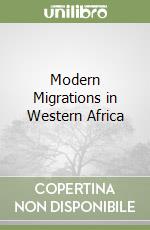 Title :
Modern Migrations in Western Africa
Title :
Modern Migrations in Western AfricaAuthor: Amin Samir (EDT) Publisher: Routledge € 42,10
|
|
1918 |
 Title :
Samir Amin
Title :
Samir AminAuthor: Membrez James (TRN), Amin Samir (TRN) Publisher: Monthly Review Pr € 27,60
|
 Title :
Samir Amin
Title :
Samir AminAuthor: Membrez James (TRN), Amin Samir (TRN) Publisher: Monthly Review Pr € 100,90
|
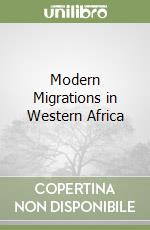 Title :
Modern Migrations in Western Africa
Title :
Modern Migrations in Western AfricaAuthor: Amin Samir (EDT) Publisher: Routledge € 159,40
|
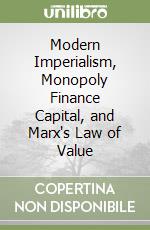 Title :
Modern Imperialism, Monopoly Finance Capital, and Marx's Law of Value
Title :
Modern Imperialism, Monopoly Finance Capital, and Marx's Law of ValueAuthor: Amin Samir Publisher: Monthly Review Pr € 104,50
|
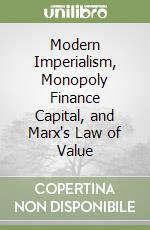 Title :
Modern Imperialism, Monopoly Finance Capital, and Marx's Law of Value
Title :
Modern Imperialism, Monopoly Finance Capital, and Marx's Law of ValueAuthor: Amin Samir Publisher: Monthly Review Pr € 31,90
|
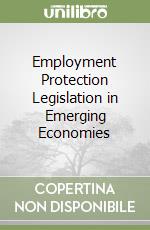 Title :
Employment Protection Legislation in Emerging Economies
Title :
Employment Protection Legislation in Emerging EconomiesAuthor: Amine Samir (EDT) Publisher: Business Science Reference € 186,60
|
|
1917 |
 Title :
A History of Africa
Title :
A History of AfricaAuthor: Jaffe Hosea, Amin Samir (FRW) Publisher: Zed Books € 22,70
|
 Title :
A History of Africa
Title :
A History of AfricaAuthor: Jaffe Hosea, Amin Samir (FRW) Publisher: Zed Books € 96,20
|
|
2017 |
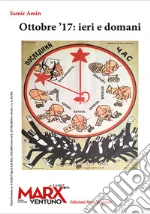 Title :
Ottobre '17: ieri e domani
Title :
Ottobre '17: ieri e domaniAuthor: Amin Samir; Catone A. (cur.) Publisher: MarxVentuno Commemoriamo l'Ottobre 1917, situando l'evento in un quadro attuale, che è solo in apparenza quello del trionfo della controrivoluzione 'liberista', poiché questo sistema è già avviato sulla strada della decomposizione caotica, che apre la via alla possibile cristallizzazione di una nuova situazione rivoluzionaria. € 10,00
Scontato: € 9,50
|
|
|
1916 |
 Title :
Nanocomposites in Electrochemical Sensors
Title :
Nanocomposites in Electrochemical SensorsAuthor: Bagheri Samira, Amiri Iraj Sadegh, Yousefi Amin Termeh, Hamid Sharifah Bee Abd Publisher: CRC Pr I Llc € 148,80
|
 Title :
Russia and the Long Transition from Capitalism to Socialism
Title :
Russia and the Long Transition from Capitalism to SocialismAuthor: Amin Samir Publisher: Monthly Review Pr € 94,60
|
 Title :
Russia and the Long Transition from Capitalism to Socialism
Title :
Russia and the Long Transition from Capitalism to SocialismAuthor: Amin Samir Publisher: Monthly Review Pr € 25,30
|
 Title :
The Reawakening of the Arab World
Title :
The Reawakening of the Arab WorldAuthor: Amin Samir Publisher: Monthly Review Pr € 24,90
|
||
|
1914 |
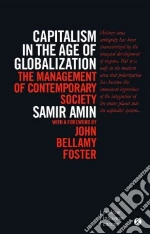 Title :
Capitalism in the Age of Globalization
Title :
Capitalism in the Age of GlobalizationAuthor: Amin Samir, Foster John Bellamy (FRW) Publisher: Zed Books Samir Amin is, and remains, one of the world's most influential thinkers about the changing nature of capitalism and North-South relations. In this highly prescient book, originally published in 1997, he provides a powerful analysis of the new and very different era which capitalism entered following the collapse of the Soviet model, and the apparent triumph of the market and globalization. Amin's innovative analysis of the rise of ethnicity and fundamentalism as consequences of the failure of ruling classes in the South to alter the unequal terms of globalization has profound implications that continue to resonate today. His deconstruction of the Bretton Woods institutions provides important insight into the continued difficulties in reforming them. Particularly striking for contemporary critics of neoliberalism is Amin's rejection of the apparent inevitability of globalization in its present polarising form. A landmark work by a key contemporary thinker. € 17,00
|
|
|
1913 |
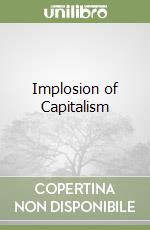 Title :
Implosion of Capitalism
Title :
Implosion of CapitalismAuthor: Samir Amin Publisher: PLUTO PRESS € 17,90
|
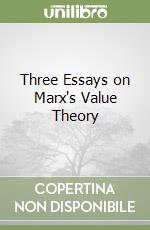 Title :
Three Essays on Marx's Value Theory
Title :
Three Essays on Marx's Value TheoryAuthor: Amin Samir Publisher: Monthly Review Pr € 19,40
|
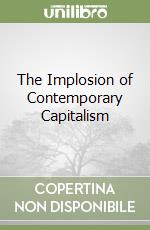 Title :
The Implosion of Contemporary Capitalism
Title :
The Implosion of Contemporary CapitalismAuthor: Amin Samir Publisher: Monthly Review Pr € 19,60
|
|
1912 |
 Title :
The People's Spring
Title :
The People's SpringAuthor: Amin Samir Publisher: Independent Pub Group The 2011 outburst of uprisings by the Arab peoples caught the world's attention, and this incisive analysis shows that the current Arab uprisings are primarily anti-imperialist—rather than anticapitalist—movements. Arguing that, to take control of their future, Arab peoples need to unify in a positive and genuinely new way and struggle alongside others against capitalism and imperialism, this book also reveals how the 2011 events have shaped an alternative future. € 24,40
|
|
|
2012 |
 Title :
Il mondo arabo nella storia e oggi. E la primavera araba?
Title :
Il mondo arabo nella storia e oggi. E la primavera araba?Author: Amin Samir Publisher: Edizioni Punto Rosso € 13,00
|
|
|
1911 |
 Title :
Food Movements Unite!
Title :
Food Movements Unite!Author: Holt-gimenez Eric (EDT), Amin Samir (INT) Publisher: Food First Books Food Movements Unite! Strategies to transform our food systems The present corporate food regime dominating the planet’s food systems is environmentally destructive, financially volatile and socially unjust. Though the regime’s contributions to the planet’s four-fold food-fuel-finance and climate crises are well documented, the ?solutions” advanced by our national and global institutions reinforce the same destructive technological path, the same global market fundamentalism, and the same unregulated consolidation of corporate power in the food system that brought us the crisis in the first place. A dynamic global food movement has risen up in the face of this sustained corporate assault on our food systems. Around the world, local food justice activists have taken back pieces of the food system through local gardening, organic farming, community-supported agriculture, farmers markets, and locally-owned processing and retail operations. Food sovereignty advocates have organized locally and internationally for land reform, the end of destructive free trade agreements, and support for family farmers, women and peasants. Protests against?and viable alternatives to?the expansion of GMOs, agrofuels, land grabs and the oligopolistic control of our food, are growing everywhere every day, giving the impression that food movements are literally ?breaking through the asphalt” of a reified corporate food regime. The social and political convergence of the ?practitioners” and ?advocates” in these food movements is also well underway, as evidenced by the growing trend in local-regional food policy councils in the US, coalitions for food sovereignty spreading across Latin America, Africa, Asia and Europe, and the increasing attention to practical-political solutions to the food crisis appearing in academic literature and the popular media. The global food movement springs from strong commitments to food justice, food democracy and food sovereignty on the part of thousands of farmers unions, consumer groups, faith-based, civil society and community organizations across the urban-rural and north-south divides of our food systems. This magnificent ?movement of movements” is widespread, highly diverse, refreshingly creative?and politically amorphous. Food Movements Unite! is a collection of essays by food movement leaders from around the world that all seek to answer the perennial political question: What is to be done? The answers?from the multiple perspectives of community food security activists, peasants and family farm leaders, labor activists, and leading food systems analysts?will lay out convergent strategies for the fair, sustainable, and democratic transformation of our food systems. Authors will address the corporate food regime head on, arguing persuasively not only for specific changes to the way our food is produced, processed, distributed and consumed, but specifying how these changes may come about, politically. € 22,30
|
|
|
1910 |
 Title :
Eurocentrism
Title :
EurocentrismAuthor: Samir Amin Publisher: CENTRAL BOOKS € 15,20
|
 Title :
Global History
Title :
Global HistoryAuthor: Amin Samir Publisher: Paul & Co Pub Consortium Responding to the need to take a fresh look at world history, hitherto dominated by Eurocentric ideologues and historians in their attempt to justify the nature and character of modern capitalism, Samir Amin looks in this book at the ancient world system and how it has influenced the development of the modern world. He analyses the origin and nature of modern globalization and the challenges it presents in achieving socialism and examines the role played by Central Asia in determining the course of world history as well as the different roads taken by Europe and China. The book looks closely at a theme that has been primordial to his contribution to political and economic thought: the question of unequal development. € 17,90
|
 Title :
Eurocentrism
Title :
EurocentrismAuthor: Amin Samir, Moore Russell (TRN), Membrez James (TRN) Publisher: New York Univ Pr Amin (director of the United Nations research institute, UNITAR, located in Senegal) critiques capitalist modernity as being characterized by Eurocentrism, a culturalist claim that internalizes the inequality and asymmetry inherent in the global spread of capitalism. Eurocentric culturalism argues that changes in cultural characteristics are what give rise to modernity (see Max Weber's The Protestant Ethic for example), whereas Amin argues precisely the opposite: that cultural change is 'more the product of the necessities of the social transformation than their cause.' He contends that modernity must be seen as an incomplete project that requires a reinvention of universal values, which in turn implies the economic, social, and political reconstruction of all of the world's societies. For this second edition, he has added a new preface and introduction and removed a chapter dealing with issues that were more pertinent twenty years ago. Annotation ©2010 Book News, Inc., Portland, OR (booknews.com) € 19,10
|
 Title :
The Law of Worldwide Value
Title :
The Law of Worldwide ValueAuthor: Amin Samir, Pearce Brian (TRN), Mage Shane (TRN) Publisher: New York Univ Pr In this extensively revised and expanded edition of the 1978 classic, Samir Amin suggests new approaches to Marxian analysis of the crisis of the late capitalist system of generalized, financialized, and globalized oligopolies following on the financial collapse of 2008. Considering that Marx's Capital—written before the emergence of imperialism as a decisive factor in capitalist accumulation—could provide no explanation for the persistent “underdevelopment” of the countries of the “global South,” Amin advances several important theoretical concepts extending traditional Marxian views of capitalist evolution. Most strikingly, he proposes adding to the model of reproduction in Volume II of Capital a Third Department of Production devoted to surplus absorption and explores the concept of “imperialist rent” by extending the Marxian 'law of value' in the form of a new “law of globalized value.” Amin sees the present crisis as a moment in the second long crisis of the capitalist system, dating from the early 1970s (the first long crisis, he maintains, lasted from 1873 until 1945). He sees no exit from repeatedcrises under capitalism except the descent into barbarism. The challenge is not to escape from the crisis of capitalism—a hopeless project—but to escape from capitalism in crisis. And Amin reasserts his historical optimism as to the socialist project, expecting a “second wave” of socialist attempts that will stem from the self-liberating efforts of the nations and peoples of the South and will lead to an awakening of the Northern popular classes to join the awakening of the global South. This book has an important place among the theoretical resources for anyone involved in the study of contemporary Marxian economic and political theory. € 20,20
|
||
|
2010 |
 Title :
L'imperialismo contemporaneo
Title :
L'imperialismo contemporaneoAuthor: Amin Samir Publisher: Edizioni Punto Rosso € 6,00
|
|
|
2009 |
 Title :
La crisi. Uscire dalla crisi del capitalismo o uscire dal capitalismo in crisi?
Title :
La crisi. Uscire dalla crisi del capitalismo o uscire dal capitalismo in crisi?Author: Amin Samir Publisher: Edizioni Punto Rosso € 13,00
|
|
|
2008 |
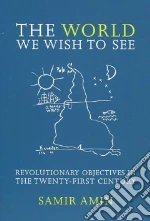 Title :
The World We Wish to See
Title :
The World We Wish to SeeAuthor: Amin Samir, Membrez James (TRN) Publisher: New York Univ Pr The World We Wish to See presents a sweeping view of twentieth-century political history and a stirring appeal to take political culture seriously. Samir Amin offers a provocative analysis of resistance to capitalism and imperialism and calls for a new politics of opposition. Capitalism is a global system, so ultimately any successful challenge to it must be organized on the same level: an 'internationalism of peoples.' Throughout the twentieth century the socialist and communist internationals, national liberation movements, and great revolutions have presented challenges to the world order. Amin provides a succinct discussion of the successes and failures of these mobilizations, in order to assess the present struggle. Neoliberalism and the drive for military hegemony by the United States have spawned new political and social movements of resistance and attempts at international organization through the World Social Forum. Amin assesses the potential and limitations of these movements to confront global capitalism in the twenty-first century. The World We Wish to See makes a distinction between 'political cultures and conflict' and 'political cultures of consensus.' A new politics of struggle is needed; one that is not afraid to confront the power of capitalism, one that is both critical and self-critical. In this persuasive argument, Amin explains that effective opposition must be based on the construction of a 'convergence in diversity' of oppressed and exploited people?whether they are workers, peasants, students, or any other opponent of capitalism and imperialism. What is needed is a new 'international' that has an open and flexible organizational structure to coordinate the work of opposition movements around the world. The World We Wish to See is a bold book, calling for an international movement that can successfully transcend the current world order, in order to pursue a better world. Amin's lucid analysis provides a firm basis for furthering this objective. € 17,60
|
|

|

|

|